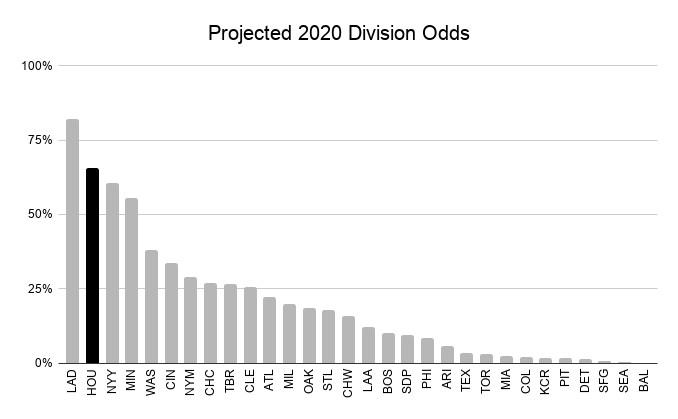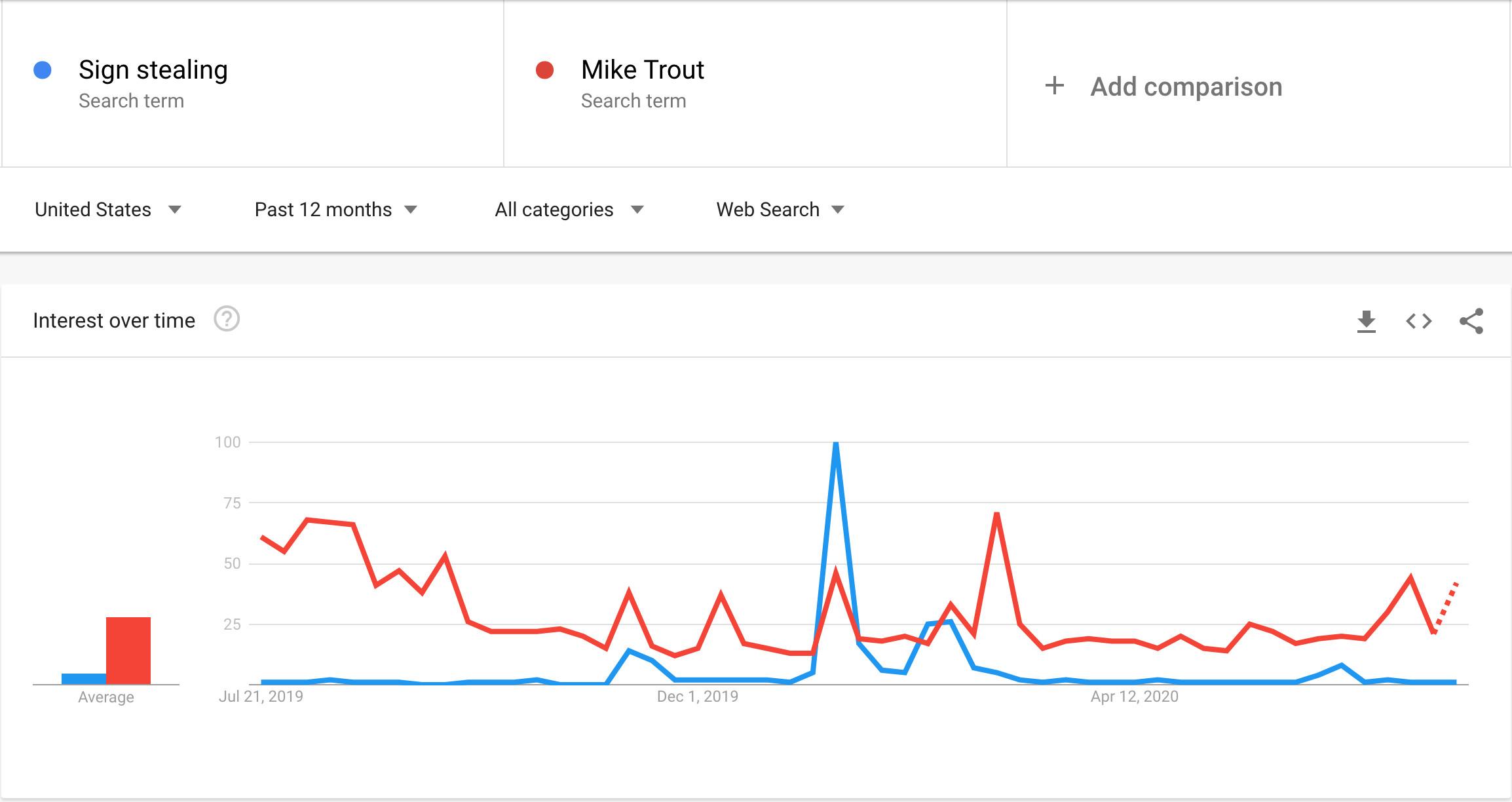Astros pitching coach Brent Strom holds a grudge, he says, which leads him to keep a strange screensaver on his computer. In the seventh inning of the seventh game of the 2019 World Series, with Strom’s Astros leading Washington 2-1, Zack Greinke threw a 2-1 changeup that Juan Soto took with his patented slide-step toward the mound. The pitch clipped the lower boundary of the strike zone, but plate umpire Jim Wolf signaled a ball.
Greinke grimaced and threw another ball on his next pitch, sending the tying run to first base with a walk. Reliever Will Harris entered, and Washington’s Howie Kendrick left the yard with a title-winning home run. Within three pitches of the controversial call on the changeup, Houston had lost the World Series lead for good.
Strom hasn’t forgotten the slight, telling reporters last week that he’s kept an image of that pitch as his screensaver because it had a 95 percent chance of being called a strike. (Baseball Prospectus’s pitch-tracking model is slightly more pessimistic, though still in general agreement, estimating a 79.8 percent called-strike probability for the pitch.) “We would have another ring,” Strom said. “I’m still pissed about it, to be quite frank. I hold onto grudges.”
In essence, a coach whose lone World Series ring came with the 2017 Astros believes the 2019 Astros were cheated out of a title. The sheer chutzpah! Irony is alive and well.
What happens if the Astros win this year’s World Series? This isn’t an unexpected thought experiment made legitimate by this strange 60-game season, like What if a batter hits .400? or Will strikeouts finally stop their unrelenting climb? The Astros were always going to contend even after an offseason initially dominated by the revelation of and fallout from the trash can banging scheme that they employed en route to winning the 2017 title.
Even amid the likely increased randomness of this season’s standings, the Astros are in a better position than almost any other team to win. As of Tuesday afternoon, the projections from FanGraphs and Baseball Prospectus average out to peg the club at 35.8 wins, tied with the Yankees for the second most in the majors. Only the Dodgers have better projected odds to win their division.

The 2019 Astros won a franchise-record 107 games, finished one win short of a title, and employed the American League’s Cy Young, Rookie of the Year, and MVP runner-up. And they might be better this season.
On offense, the 2019 club had the second-best lineup in MLB history, as measured by wRC+, which adjusts for park and league context. Only the Murderers’ Row 1927 Yankees have ever been better. The 2020 team returns the regular starter at every position except catcher.
If anything, this year’s lineup looks even better than last year’s group; the 2019 team slugged so sweetly while missing a number of stars for long stretches; Alex Bregman was the only Astro to play at least 150 games. José Altuve missed 38. George Springer missed 40. Carlos Correa and Yordan Álvarez combined to miss 162, a full season’s worth, due to time spent on the injured list and in the minor leagues, respectively.
The lineup should also benefit from addition by subtraction. Of the Astros’ six least-productive batters last season, five won’t play for the team this year. The one exception is right fielder Josh Reddick, who might quickly be supplanted by outfield prospect Kyle Tucker—a ready replacement who produced a 30-30 season in the minors in 2019.
Overall, FanGraphs projects the Astros for the most valuable group of position players in the majors, with a narrow advantage over the Dodgers. The pitching projection isn’t quite as lofty, but the Astros should still have a top-10 staff. The rotation will miss Gerrit Cole and, to a lesser extent, Wade Miley—but now it gets a full season of Greinke, instead of the smaller bit after last year’s trade deadline, and it gets Lance McCullers Jr. back on the mound after he missed all of 2019 due to Tommy John surgery. Cole and Miley project to combine for 2.9 WAR this year, per FanGraphs; Greinke and McCullers aren’t far behind at 2.2. The tradeoff isn’t great because any team would rather have Cole in the rotation than not, but it’s not prohibitive, either.
New skipper Dusty Baker is also a worthy replacement—not only a respected influence in the clubhouse, but a darn good manager in his own right. In his managerial career, Baker has more seasons with 90-plus wins—including both of his seasons with the Nationals, his most recent team, and his last two seasons with the Reds, his second most recent team—than seasons with a losing record.
He’s proved particularly potent when he first arrives with a new club. In his previous managerial stints, Baker’s teams always improved in his first season, by an average of 16.5 wins. That kind of improvement might not be possible with Houston due to the team’s high benchmark (107-55 translates to a 40-20 record in 60 games), but Baker’s history suggests little opportunity for a decline in the team’s record.
Dusty Baker’s First Years on the Job
The Astros’ quest to avenge their World Series loss—and allow Strom to move on to a new screensaver—has already met some hurdles. COVID-19 testing delays forced the club to cancel multiple practices. Álvarez and starter José Urquidy have yet to participate in team workouts this summer, and were placed on the injured list for undisclosed reasons last week.
From a crass, on-field perspective, though, the Astros derived some advantage from the delayed start to the season. It meant more time to recover for McCullers and reigning Cy Young winner Justin Verlander, the latter of whom was poised to miss the start of the season due to groin surgery but now is able to take the mound on Opening Day. The shorter schedule might also ease the burden on the Astros’ young pitchers; Josh James, the flame-throwing but inconsistent righty who will enter the team’s rotation this year, might find it easier to harness his stuff over 60 innings instead of 160.
And the lack of crowds on the road could impart an immeasurable benefit on the club, which won’t have to adjust to constant, vehement booing on the heels of the cheating scheme. Which returns us to the initial question: What happens if the Astros win this year’s World Series?
Until the coronavirus shut down the sport for months, the Astros’ sign-stealing scandal was the only MLB story worth following. For some weeks earlier this year, as the league’s investigative report emerged with evidence of wrongdoing and the Astros began spring training with a cringeworthy apology at a press conference, more people Googled the term “sign stealing” than “Mike Trout.”

Ostensibly centered on what happened during the 2017 season, the story persisted through the offseason and was set to define the 2020 campaign, too—for commissioner Rob Manfred, for fans and casual baseball observers, for opposing players intent on expressing their displeasure with the Astros’ actions and even threatening retribution.
And then the sport stopped in place, and the story faded. Look at that Google Trends graph again; the “sign stealing” line is almost flat since March. It wasn’t just that there were no games and no Astros players to boo; the existential question their cheating inspired about the sport’s fairness gave way to a host of different existential questions that were simultaneously more pressing and wider-reaching: about labor, about the ethics and logistics of health and safety measures, about the sport’s financial foundation.
Even with the recent return of on-field play and the pending start to the 2020 regular season, the attention remains squarely on the coronavirus and its effects rather than returning to Houston. That shift might—and probably should—last the whole year, given the unprecedented nature of this season.
But reminders of the scandal that so recently consumed the sport will appear in the empty spaces, the usual parts missing from this baseball season. For instance, if a pitcher throws at Altuve or Bregman—who incidentally were hit in consecutive plate appearances in a scrimmage with the Royals while I was writing this piece Tuesday—social distancing guidelines mean a brawl cannot sprout in response. Perhaps most of all, fans cannot boo the hated Houston hitters within hearing distance. And oh, were fans ready to boo.
The boos were loud, the signs biting, at the Astros’ spring training opener before the shutdown, in which the team’s lineup didn’t even include the regulars who had whaled away on trash cans in 2017. There would have been more vitriol with the stars in the lineup, during games that counted, in road ballparks fully filled with fans who’d felt cheated by the braggadocious Astros. Supporters of the Dodgers—who fell in seven games in the 2017 World Series—and Yankees—who lost to Houston in both the 2017 and 2019 ALCS—were planning to travel in groups to the Astros’ first road game, in Anaheim.
Without that opportunity, they’ll lose some small, ethereal component of the very experience of fandom. There’s a catharsis in booing, an energizing communal activity that cannot be replicated alone, at home, in front of a TV or computer screen. Bregman won’t notice a clever sign or taunting trash can prop if it’s unveiled miles away, instead of feet away down the third-base line.
The Astros would have contended for another title without the pandemic’s intervention, but at least then, opposing fans would have been mad but able to express their anger. Now, they may be a bit less mad, their potential anger tempered by the strangeness of the season and the more vital priorities in the sport and the world at large, but they’ll also be forced to deal with that anger without that outlet. Even fans unable to attend games in a normal season could have drawn inspiration and community from their proxies booing lustily in crowds on the road; alas, now they’re cordoned off at home.
A broader question concerns the legitimacy of another Houston championship. The Astros are stuck between a rock and a hard place in 2020. Either they struggle, in which case opposing fans can point to convincing evidence that sign stealing fueled the team’s recent run of success, or they continue to club home runs up and down the lineup, in which case opposing fans can believe they must still be guilty via a different undetected method of malfeasance. (I suspect the Astros will do just fine at the plate without trash can assistance: From 2017 through 2019, the Astros hit .270/.343/.465 at home, where they cheated, and .270/.342/.468 on the road, where there’s no evidence they did.)
The Astros surely wouldn’t bang trash cans to steal signs again—at the very least, those drums would be easier to hear in a fan-less stadium—but after an offseason rife with rumors of buzzers and other insidious paraphernalia, opposing fans (and maybe even suspicious opposing players) just as surely won’t be convinced that another winning Astros team is clean. Proving a negative isn’t possible.
As if this season weren’t already sufficiently twisted, then, beware the cognitive dissonance that might arise between, on one hand, the thrills of an actual month of playoffs if MLB manages to safely field a season all the way through the World Series, and, on the other, the bitterness of another Houston celebration. The 2017 title already inspired the “Houston Asterisks” moniker, and the 2020 season is already inviting asterisk questions because of its strangeness. Combine the two factors, and Manfred’s “piece of metal” could end the season without any meaning at all.

